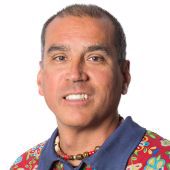
Dwayne Donald
Personal Website: https://www.unlearningcolonialism.ca/
Contact
Tier 1 Canada Research Chair and Professor, Faculty of Education - Secondary Education Dept
- ddonald@ualberta.ca
- Phone
- (780) 492-5639
- Address
-
445 Education Centre - South
11210 - 87 Ave NWEdmonton ABT6G 2G5
Overview
About
Dwayne Donald was born and raised in Edmonton and is a descendent of the amiskwaciwiyiniwak (Beaver Hills Cree).
Research
Dwayne is a Tier 1 Canada Research Chair in Reimagining Teacher Education with Indigenous Wisdom Traditions, and this work focuses on ways in which Indigenous wisdom traditions can expand and enhance understanding of curriculum and pedagogy.
To learn more on Dwayne's CRC work, visit this webpage: https://www.unlearningcolonialism.ca/
If you are interested in pursuing graduate studies in education on these topics or related issues, please contact Dwayne directly at dwayne.donald@ualberta.ca.
Teaching
Courses Taught
EDSE 409: Indigenous Curriculum and Pedagogy EDU 561: Curriculum, Pedagogy, and Foundational Indigenous Knowledge and Knowing
EDSE 504: Curriculum Inquiry
EDSE 603 A & B: Holistic Approaches to Life and Living
Scholarly Activities
Research - Publications
Refereed Articles
Donald, D (2009, Spring). Forts, Curriculum, and Indigenous Métissage: Imagining Decolonization of Aboriginal-Canadian Relations in Educational Contexts. First Nations Perspectives: The Journal of the Manitoba First Nations Education Resource Centre, 2 (1), 1-24. Available online at: http://www.mfnerc.org/images
Johnston, I., Carson, T., Richardson, G., Donald, D., Plews, J. & Kim, M. (2009). Awareness, Discovery, Becoming, and Debriefing: Promoting Cross-Cultural Pedagogical Understanding in an Undergraduate Education Program. Alberta Journal of Educational Research, 55(1), 1-17.
Donald, D. (2004). Edmonton Pentimento: Rereading History in the Case of the Papaschase Cree. Journal of the Canadian Association for Curriculum Studies, 2(1), Spring, 21-54.
Donald, D., Hasebe-Ludt, E., & Chambers, C. (2002). Creating a Curriculum of Métissage. Educational Insights, 7(2). Available online: http://www.ccfi.educ.ubc.ca/publication
Book Chapters
Donald, D. (2009). The curricular problem of Indigenousness: Colonial frontier logics, teacher resistances, and the acknowledgment of ethical space. In J. Nahachewsky and I. Johnston (Eds.). Beyond Presentism: Re-Imagining the Historical, Personal, and Social Places of Curriculum (pp. 23-39). Rotterdam/Boston/Taipei: Sense Publishers.
Chambers, C., Hasebe-Ludt, E., Donald, D., Hurren, W., Leggo, C. & Oberg, A. (2008). Métissage. In A. Cole (Ed). Handbook of the Arts in Qualitative Research: Perspectives, Methodologies, Examples, and Issues. Thousand Oaks, CA: Sage Publications, pp. 141-153.
Book Reviews
Donald, D. (October 2006). Canada and Its Indigenous Peoples: Resistance or Engagement? Review of Alfred, T. (2005). Wasáse: Indigenous Pathways of Action and Freedom and Turner, D. (2006). This Is Not a Peace Pipe: Towards a Critical Indigenous Philosophy in Literary Review of Canada, 14(8), 8-10.
Selected Presentations
On What Terms Can We Speak? Aboriginal-Canadian Relations as a Curricular and Pedagogical Imperative. Invited Lecture, Faculty of Education Graduate Studies, University of Lethbridge July 2010. D. Donald.
‘Do They Like Indians?’ Exploring Tensions and Ambiguities Associated with Teaching and Learning from Indigenous Standpoints. Canadian Association for the Study of Education (CSSE) Conference. Montreal, Quebec May 2010. D. Donald.
Learning from Difficult Knowledge: Curriculum and Pedagogical Challenges of Truth and Reconciliation. Canadian Association for the Study of Education (CSSE) Conference. Montreal, Quebec May 2010. T. Carson, D. Donald.
aoksisowaato’p ki aokakio’ssin: Imagining Organic Curriculum for Relational Renewal. Globalization, Diversity & Education Conference. Spokane, Washington. February 2010. C. Chambers, E. Hasebe-Ludt, R. Big Head, D. Donald.
Curriculum, Colonial Frontier Logics, and Ethical Relationality. The Third World Curriculum Studies Conference. Somerset West, South Africa, September 2009. D. Donald.
Learning from Difficult Knowledge: Aboriginal Peoples, Truth and Reconciliation, and Canadians. The Third World Curriculum Studies Conference. Somerset West, South Africa, September 2009. T. Carson and D. Donald.
Peace and Ecological Imagination: Learning from land, place, and story. Invited public address sponsored by theSummer Institute 2009: Building Peaceful Communities. Edmonton, Alberta. July, 2009. D. Donald
Forts, Curriculum, and Indigenous Métissage. National Panel Keynote Address: Provoking Curriculum Conference. Ottawa, Ontario. May 2009. D. Donald
Curricular and Pedagogical Intents: Aboriginal Perspectives, Social Studies, and Teacher Education. Canadian Association for the Study of Education (CSSE) Conference. Ottawa, Ontario. May 2009. K. den Heyer, D. Donald
The Curricular Problem of Indigenousness. Canadian Society for the Study of Education (CSSE) Conference. University of British Columbia June 2008. D. Donald
On the Fluxic Nature of Openness and Closure: Frontiers, Forts and the Indigenous Experience with Civilization and Development. Canadian Society for the Study of Education (CSSE) Conference. University of British Columbia June 2008. D. Donald
Featured Publications
Johnston, I., Carson, T., Richardson, G., Donald, D., Plews, J. & Kim, M.
Alberta Journal of Educational Research. 2009 January; 55 (1):1-17
Donald, D
First Nations Perspectives: The Journal of the Manitoba First Nations Education Resource Centre. 2009 January; 2 (1):1-24
Donald, D.
2009 January;
Chambers, C., Hasebe-Ludt, E., Donald, D., Hurren, W., Leggo, C. & Oberg, A
2008 January;
Donald, D.
Journal of the Canadian Association for Curriculum Studies. 2 (1):21-54